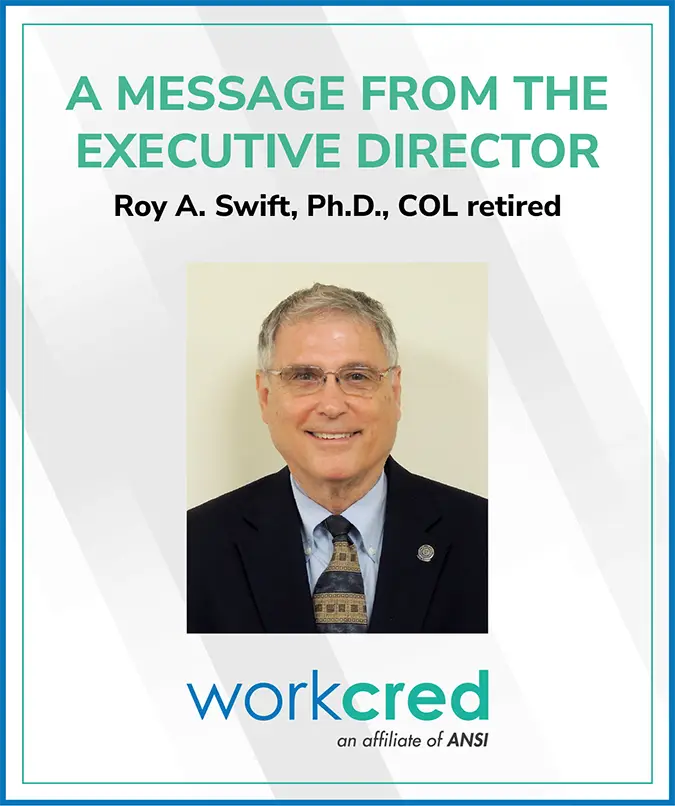
Planting the Seeds for Change: Workcred Supports a Transformative Workforce Landscape with Strategic Collaborations
October 2025
As we embark on this new season, Workcred is seizing the moment with a multi-faceted approach to bridge pathways from education to careers. I’m delighted to share updates on a few strategic partnerships and innovative programs that are reshaping the connection between academia and industry needs.
Strengthening Partnerships to Create More Pathways
One exciting game-changer is Certification + Degree (C+D) pathways. Through a partnership with the League for Innovation in the Community College and the Higher Learning Commission, and with the hard work of four community colleges,
Workcred and its partners are improving workforce preparation with increased validity. By embedding industry certifications into associate degree programs, colleges can prepare graduates to achieve more—they have the broad-based skills of an academic
degree and the valuable, competency-based certifications that get the attention of hiring managers.
As we continue to share how non-degree credentials are also becoming a vital part of the new workforce equation, we offer organizations a way to develop and issue credentials that match the speed of business.
On October 15, Workcred and its partners will host a Micro-chat to showcase how the Community College of Aurora, Kirkwood Community College, and Moraine Valley Community College integrated certifications into several information
technology and health science degree pathways, while establishing sustainable, cost-effective processes that other institutions can adapt and scale.
We also recently hosted a session at the 2025 Convergence: Credential Innovation in Higher Education conference called, “If You Build It, They Will Come: A Microcredential Development Workshop.” Whether new to the process or
seeking strategies to enhance what you already have, we can help equip you with tools and insights you need, and are proud that this approach has received recognition from national thought leaders in education.
Building on these efforts, Workcred and the National CyberWatch Center have developed an accreditation model that validates both the skills of learners and the effectiveness of cybersecurity community clinics.
These clinics are operated by non-profit or for-profit organizations outside of higher education, and provide essential cybersecurity services to local governments, non-profits, and businesses.
The accreditation model ensures clinics deliver high-quality and consistent learning for cyber professionals while offering quality services to the clients they serve. Workcred will join the CBExchange Conference on
November 11 to share more details about this accreditation model during the session, “Standing at the Forefront of Cybersecurity: Developing a Community-Based Accreditation Model.”
Supporting a Shifting Manufacturing Workforce
The rise of AI systems in manufacturing has fundamentally shifted the workforce landscape, and the future of manufacturing depends on creating collaborative teams where AI augments rather than replaces human skills. This evolution is exactly what I will explore on
October 22 through my fireside chat at the Manufacturing Revolution: Building on AI Success in Smart Production and Supply Chains event, part of ANSI’s inaugural Innovation Summit. Join me, Dr. Brad R. Conrad from the National Institute of Standards and Technology
Office of Advanced Manufacturing, and Shalin Jyotishi from New America's Future of Work and Innovation Economy Initiative,
as we uncover invaluable insights into the upskilling and reskilling challenges and opportunities facing today’s vast manufacturing workforce.
Addressing Misinformation, Because We Need To
As we continue to champion credentialing innovations through research and partnerships, I must emphasize how crucial it is to stay vigilant about the information landscape surrounding certifications. With new digital and AI tools, we are seeing an uptick in misleading news
and resources that cite outdated or incorrect information about certification requirements, pathways, and most importantly, value.
Many thought leaders, including myself, are concerned about data being pulled from unnamed or unreliable sources. Why does this matter? Certification bodies have discovered the data collected about their credentials is inaccurate – and such findings
fuel false conclusions and misinformed reports. And, although the goal of finding credentials of value has merit, the methodologies currently being utilized need improvement to ensure that misinformation does not damage quality credentialing bodies and credentials.
Students, educators, and employers alike depend on verified sources to make the credentialing decisions that work for them. Workcred remains committed to empowering certifications by taking a seat at the table and sharing research-backed guidance that helps everyone make
informed choices about their credential journey.
We also hope you’ll come on November 18 and explore “A Whole New World for Credentialing: The Future of State Policy and Third-Party Data” with Workcred, Houston City College, and the Board of Certified Safety Professionals at the I.C.E. Exchange
conference where credentialing professionals, industries, and experts across different roles share knowledge, answer questions, and build connections.
As we settle into this new season, one message is abundantly clear: the future of workforce development isn’t happening in silos—it's happening through collaboration, innovation, and a shared commitment to reliable data that can make a life-changing difference.
Sincerely,

Roy A. Swift
